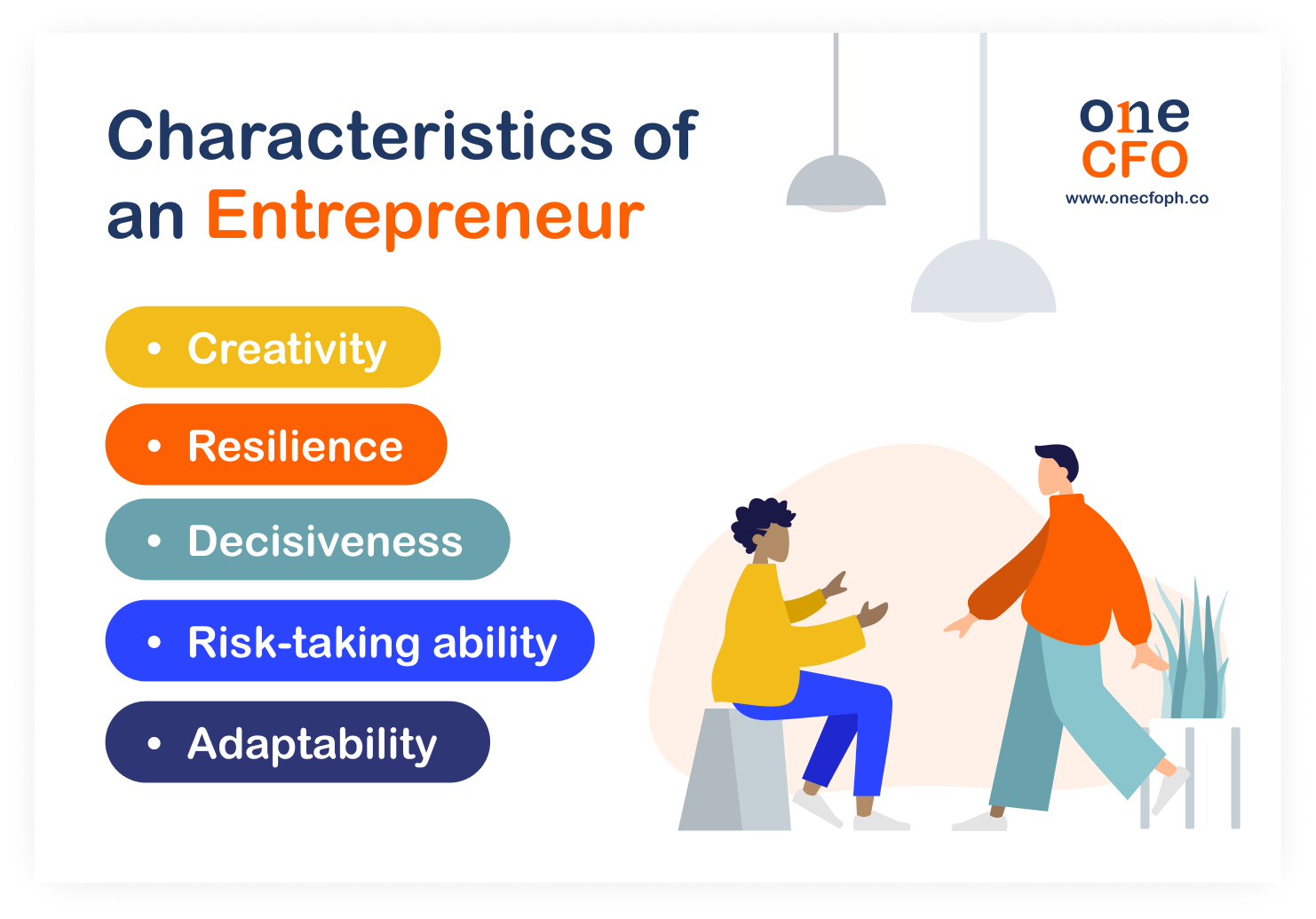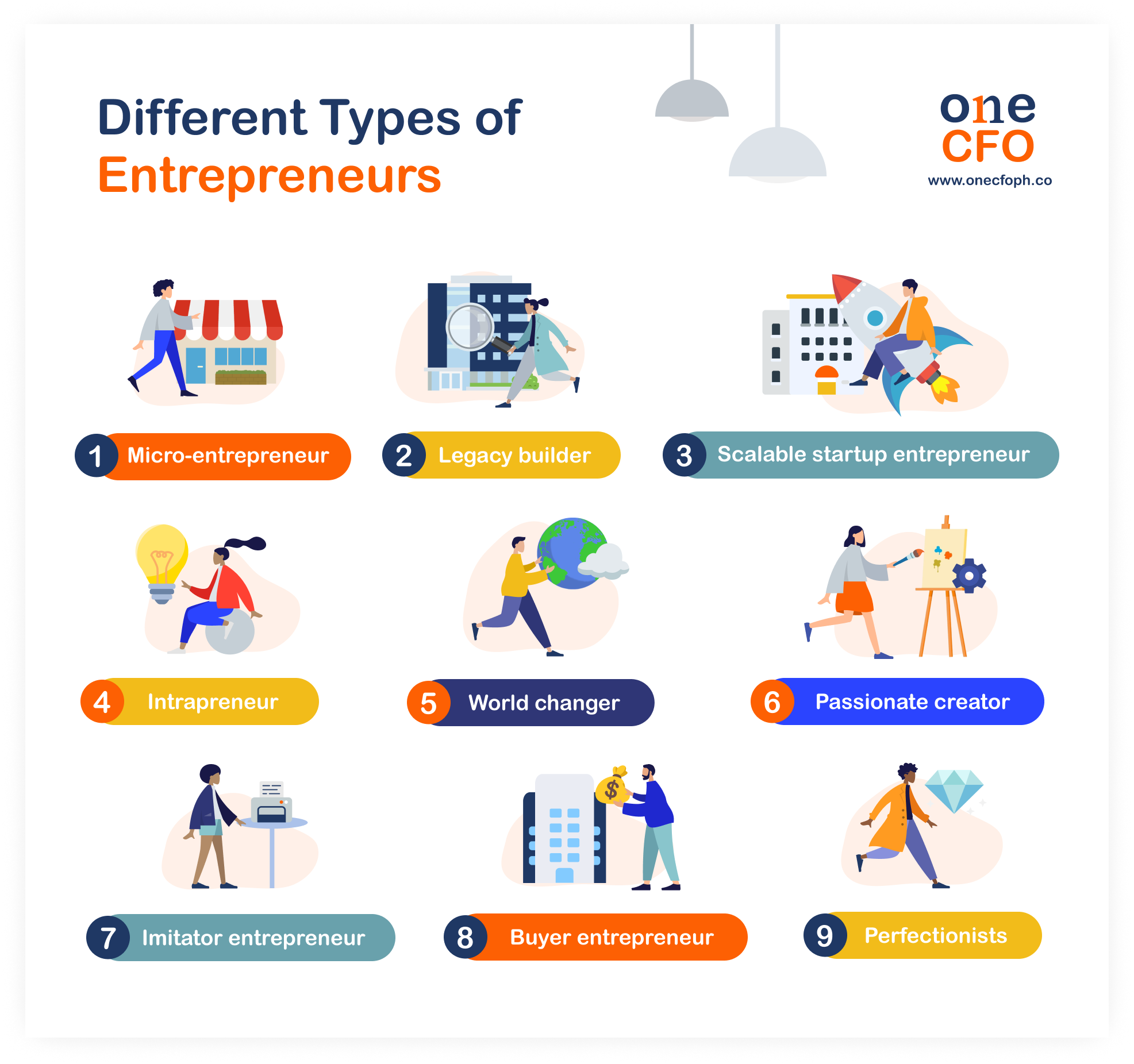
July 17, 2023 | 7:28 pm
Table of Contents
Entrepreneurs help make the world go round - they make life-changing innovations, create
jobs, stimulate economic growth, and bring change to improve society. But did you know there
are different types of entrepreneurs?
Becoming an entrepreneur isn’t limited to starting a small business, building a large
corporation, or becoming the next Steve Jobs. There are many types of entrepreneurs - all of
which has different goals, traits, risk appetite, and measurements of success.
Which one are you?
You could be the type of entrepreneur who wants to keep your business venture small or wants
to scale. Some entrepreneurs are dedicated to creating social change, while others are
willing to innovate or push for breakthroughs. Another type of entrepreneur builds and
improves upon what others already started.
Learning what type of entrepreneur you are helps you understand individual strengths,
weaknesses, and natural inclinations. This self-awareness guides you to make business
decisions more aligned with your strengths, passions, and goals. Understanding the type of
entrepreneur you are, highlight the areas where you may need additional support or
development.
This guide lists different types of entrepreneurs with their meanings and examples so you
can identify what type you fall into.
What is an entrepreneur?
A simple definition of an entrepreneur is an individual who
takes on the initiative and
assumes risks and responsibilities in launching and managing a business venture. By taking
on the risk, entrepreneurs also stand to reap the rewards of their venture, which could vary
depending on how they define their business success.
Entrepreneurs are necessary for a functioning society because of all the opportunities they
create. Launching businesses boosts the economy by increasing employment and encouraging
investments. Their services and innovations also improve society’s quality of living.
Driven by their vision, entrepreneurs identify opportunities and organize resources to bring
their ideas to fruition. Becoming an entrepreneur means maximizing your skills, whether in
marketing, selling, or any other business skill, to achieve your goals.
What characteristics does an entrepreneur have?

Aside from skills, entrepreneurs also share several characteristics to help them stay the course. Different types of entrepreneurs exhibit these characteristics:
It is important to note that not all entrepreneurs possess every characteristic to the same degree. The level of value varies depending on the individual and the specific entrepreneurial endeavor.
What are the different types of entrepreneurs?
Whether you’re already a business owner or an aspiring entrepreneur, learning what type of
entrepreneur you are will help your journey. Understanding these different types allows you
to know yourself better, especially your strengths, weaknesses, and guiding principles.
Here are the nine types of entrepreneurs:

Micro-entrepreneur
A micro-entrepreneur runs a micro-enterprise, also known as a small-scale business.
Typically a micro-enterprise is characterized by having a limited number of employees, low
capital investment, and serving a local or niche market.
According to the Department of Trade and Industry (DTI), 99% of enterprises in the country
are small businesses. Some common examples of small-scale businesses are your area's local
grocery stores, boutiques, or mom-and-pop shops. Other small businesses also start with
people turning their hobbies into a source of income.
As a micro-entrepreneur, you can opt to run your business by yourself at the start. However,
hiring other people, like your family or locals, can be necessary to grow your company.
You must also be financially savvy, as small businesses typically operate on limited
resources and tight budgets. Some essential things to know are managing cash flow and
reducing expenses to make informed
decisions and mitigate financial risks.
What is a solopreneur?
Solopreneurs, such as consultants, coaching, or
freelancers, can also be considered
micro-entrepreneurs. The main difference from traditional small businesses is that they
mainly provide services instead of selling goods.
Combining “solo” and “entrepreneur,” solopreneurs emphasize work's independent and
entrepreneurial nature. They operate their businesses independently, often providing
specialized services or expertise to clients on a freelance or contract basis.
Like other micro-entrepreneurs, solopreneurs face the challenges of managing limited
resources to ensure financial sustainability. But being solo means you are typically
responsible for all business aspects, including operations, marketing, finance, and customer
service.
Legacy Builder
On the other hand, legacy builders are entrepreneurs who focus on creating a lasting impact.
They are driven by financial success and creating a meaningful and enduring legacy through
their actions, contributions, and accomplishments.
A legacy builder aims to build a business that can thrive even after their direct
involvement. They want to leave a positive imprint on their industry, community, or
society.
This type of entrepreneur is guided by a strong purpose and a desire to make a difference. A
forward-thinking mindset helps this type of entrepreneur develop strategic plans and
decisions considering the impact on future generations.
Legacy builders focus on developing future leaders to ensure the long-term continuity of
their businesses beyond their involvement. They can establish effective succession planning
and see that capable individuals carry forward their vision and values.
One prime example of a legacy builder entrepreneur is Tony Tan Caktiong, the founder of
Jollibee. From a little ice cream and burger food outlet, Jollibee is now one of the
country's largest and most successful fast-food chains. Under Tan Caktiong’s leadership,
Jollibee became an iconic brand in the Philippines and internationally, leaving a lasting
legacy in the food industry.
Scalable startup entrepreneur
Entrepreneurs who use business models that are both scalable and repeatable are considered
scalable startup entrepreneurs. With these business models, startup entrepreneurs grow their
companies rapidly by developing innovative solutions to everyday problems, disruptive
technologies, or unique products or services that can quickly capture a significant market
share.
Besides the financial gain, most startups aim to fill a market gap through innovative ideas.
Venture capitalists often fund startups since they can get their return on investment much
quicker. However, it’s also possible for you to bootstrap your startup.
When building a startup, it’s essential to focus on relevant KPIs such as conversion
rates
and customer acquisition costs. Attracting investors also means knowing how to manage your
equity wisely.
Most importantly, you need a clear and long-term plan to achieve company growth and
profitability. You can develop a product roadmap to guide you and your team when developing
new customer features and offerings.
Companies like Uber and Canva are successful businesses
founded by startup entrepreneurs. In the local scene, Advance, a fintech company that
offers a salary-on-demand platform, is continuing to help employees meet their daily
financial requirements at a click of a button.
Another startup offering a unique service is the Avion School. It helps Filipinos to
upskill by teaching them how to be software engineers and find employment among their
partners.
Intrapreneur
An intrapreneur is an
employee who acts like an entrepreneur within an organization and
exhibits innovative and entrepreneurial qualities. They often identify growth opportunities,
propose creative solutions, and lead initiatives that drive positive organizational change.
Being an intrapreneur allows you to develop and implement new ideas, products, or processes
within the organization. The benefit of being an intrapreneur is how the company’s resources
are at your disposal. However, this also means that the credit for your idea is awarded to
the company rather than just to you.
Facebook and Google are some companies that hold internal hackathons or competitions to
allow their employees to pitch business ideas. This way, they can continuously encourage
innovation and develop their employees’ entrepreneurial spirits.
World changer
If your primary business goal is to create social change, you’re a world changer or social
entrepreneur. This type of entrepreneur aspires to change the world by addressing
inequality, environment, economic development issues, or other societal challenges.
Depending on the approach, world-changer entrepreneurs' business ventures can be for-profit
or non-profit. Some entrepreneurs create for-profit businesses that have a solid social or
environmental impact. On the other hand, some world-changer entrepreneurs may opt to
establish a non-profit organization that focuses solely on addressing an issue without the
primary goal of generating profits.
World-changer entrepreneurs are not solely motivated by financial success but also by the
desire to improve people's lives. They often embrace sustainable practices and social
responsibility and have a strong sense of purpose in their entrepreneurial pursuits.
An example of a social business in the Philippines is Pic-A-Talk, which aims to help
children with autism, speech delay, and other learning disabilities. These children get help
with their complex communication needs through Pic-A-Talk’s assistive mobile application.
Passionate creator
Passionate creators or innovative entrepreneurs are driven by an innate desire to bring
their ideas and visions to life, fueling their creativity, dedication, and joy in the
creation process. They always think about the “next big thing.”
Furthermore, passionate creators love what they do and derive joy and fulfillment from
creating. Their natural curiosity and commitment drive them to challenge themselves and be
willing to step outside their comfort zones.
As a passionate creator or innovator, you possess fearlessness and courage - not afraid to
challenge conventions and express your unique perspectives. In doing so, you can receive
lots of resistance from people who don’t share your vision. However, when planned and
launched successfully, your business will stand out.
Some famous innovators include Larry Page
of Google, Elon Musk of Tesla
Motors and SpaceX, and Evan Spiegel of Snapchat.
Imitator entrepreneur
An imitator entrepreneur, also known as a copycat entrepreneur, is an individual who builds
a business or ventures into a market, replicating an existing successful business model,
product, or service.
Instead of creating something entirely new or innovative idea, imitator entrepreneurs
observe closely what successful businesses are doing. They identify opportunities to imitate
or replicate key features, marketing approaches, pricing strategies, or operational
methods.
An example is when Instagram rolled out the Stories feature after Facebook
acquired the
company. Even though the Stories feature is considered an imitation of Snapchat, this
feature still attracted millions of new users to Instagram.
Being an imitator is less risky than being an innovator since they can learn from others’
mistakes before launching their businesses. While they mimic successful businesses, they can
adjust to suit their circumstances or capitalize on untapped market segments. They refine
the business further to differentiate themselves from others.
However, they must also be mindful of legal considerations such as intellectual property
rights and other legal issues that come with imitating an existing business or product.
Buyer entrepreneur
If you have deep pockets and expertise in growing businesses, you can choose to be a buyer
entrepreneur!
Buyer entrepreneurs specialize in looking for businesses, evaluating their viability, buying
them, and actively working to grow the business. After some time in leadership, buyer
entrepreneurs usually hand the company to a trusted person who can run it. At the same time,
they start looking for another business to acquire.
One advantage of becoming a buyer entrepreneur is you are already purchasing a
well-established business, which significantly reduces the risk on your end. This business
already has a market and robust product line, so you don’t need to worry about innovating
products.
Warren Buffett is an example of a buyer entrepreneur when he bought Berkshire Hathaway and
made it the world’s largest holding company.
Perfectionists
Perfectionists, also known as researcher entrepreneurs, take their time to study all the
necessary data and information before launching their business idea. They are perfectionists
because they prepare multiple contingency plans and ensure everything is foolproof when they
start their business.
Although their business planning and preparation might take a while, businesses of
researcher entrepreneurs have higher chances of succeeding since they rely mainly on backed
data instead of intuition.
Perfectionists take the slightest risk among all the different types of entrepreneurs and
don’t prioritize innovation as much for their businesses.
Theodor Hänsch, an academic researcher turned entrepreneur falls under the researcher
entrepreneur type when he used his study of optical frequency to launch his business, Menlo
Systems.
How to become a successful entrepreneur?
No matter what type of entrepreneur you are, you all have a common goal: to make your
business successful. Otherwise, why would you have started your business at all?
Becoming a successful entrepreneur combines your entrepreneurial traits and business skills.
But most of all, a successful business requires a good grasp, knowledge, and understanding
of your financials!
Finance is the heart of any business and drives it forward, so you need a trusted partner to
guide you toward any business financial decision.
The excellent news is OneCFO is here for all your financial needs! By subscribing to
OneCFO’s services, you will have your all-in-one finance department, including high-level
CFO services, bookkeeping and tax services, and payroll services!
Learn more about OneCFO and how we can be your partner for growth:
Contact us now!
Read our disclaimer here.